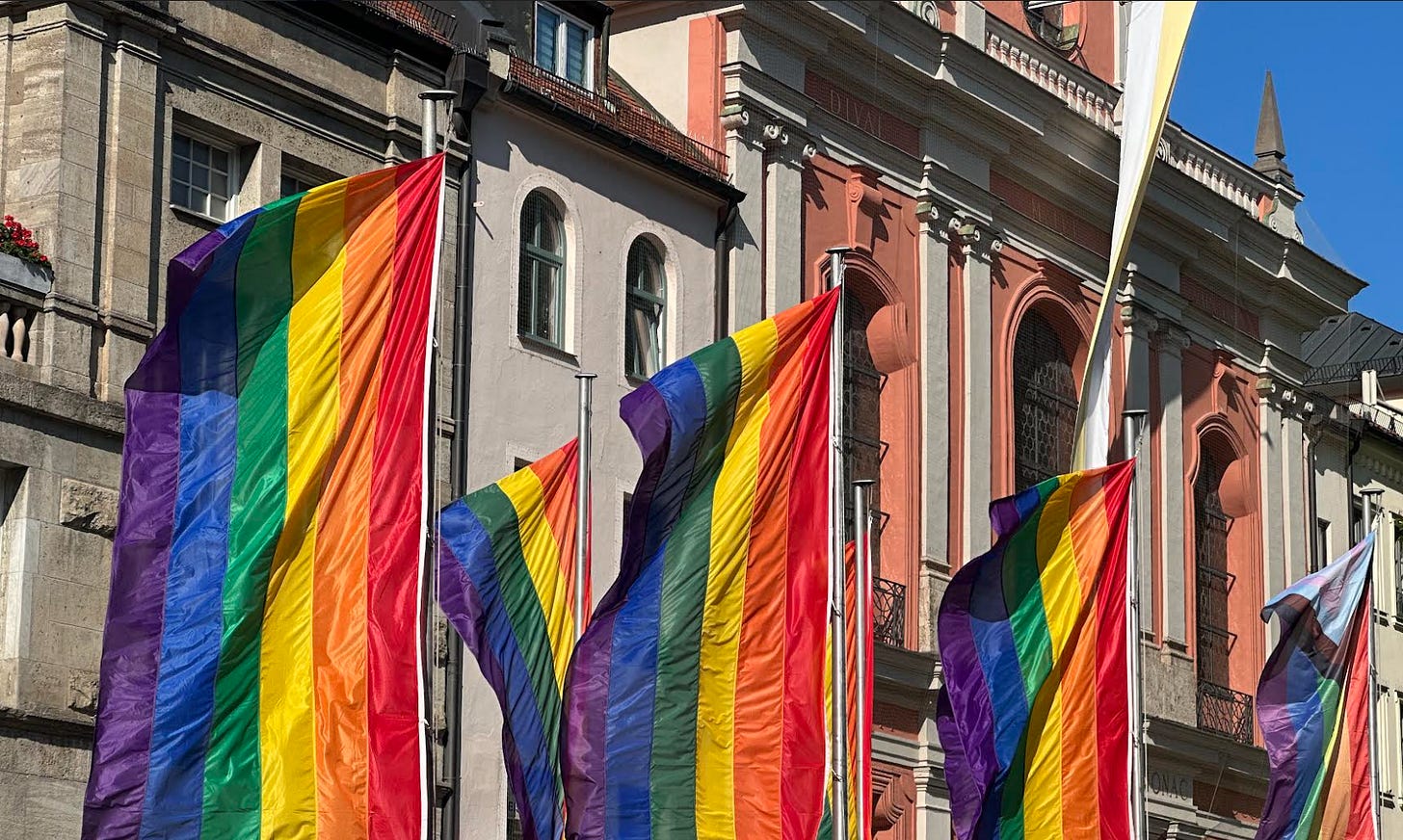The Meaning of the Rainbow Revolution
Across all of human politics, the Western liberal tradition stands out for its ambitions to circumscribe state power. The people, in this tradition, are held to be the locus of sovereignty, and most Western governments are bound by elaborate constitutions which purport to constrain their jurisdiction over citizens, and which many regard as bearing a nearly religious authority. In Germany, an entire government agency, the Federal Office for the Protection of the Constitution, is granted wide powers to hunt down potential constitutional enemies. These constitutions do many things. They extend a wide of variety of rights not only to citizens, but often to all of humanity. They often divide state powers by placing the judicial, executive and legislative branches of government in quasi-independent silos, hoping that each of these branches will defend their respective prerogatives from depredations by the others and, in the process, impose self-interested checks on the reach and the arbitrary exercise of power.
This approach to politics has not aged well. Covid was a low point, simply for revealing the steely and actually quite anti-liberal authoritarianism these systems have been nurturing in their innermost chambers for many decades. Western liberal states in the modern era do not behave like limited systems which derive their sovereignty from the people. Every day, they more and more resemble the kinds of unchecked, totalitarian regimes we remember from the Soviet period. If anything, they seem poised to become a good deal worse, for they are able to achieve relatively prosperous economic conditions and to harness popular support far more efficiently, thus evading the harder constraints on the ambitions of the old Warsaw Pact governments.
State power wishes to be free, in the same way that water wishes to flow downhill. The problem with liberal checks on power, is that they forced the state to develop novel legal and cultural solutions to overcome them. State politics in liberal systems has thus come to resemble antibiotic-resistent bacteria in hospitals – it has evolved a general resistance to constitutional limitations, in the process becoming an altogether worse and more dangerous animal. The mutual checks and balances imposed on the state by its competing branches, for example, have merely incentivised the political establishment to develop and enforce among its members a uniform elite outlook, which encourages cooperation towards shared goals among erstwhile rivals. This cultural solution has proven wildly successful, not merely releasing the state from many old encumbrances, but even extending its reach across many more facets of society, as ordinary people adopt and enforce the prestige ideology of the regime.
Rights and individual sovereignty have required a rather different, perhaps even more insidious solution. Rather than undermining or qualifying these prerogatives, state ideologues have leaned into them instead. Rights in the liberal conception are fundamentally pre-political; men are endowed with them by their creator and they are inalienable. The concept thus promises many avenues for subverting the popular, democratically expressed will, and the state has worked vigorously to expand the concept of rights, investing ever more regime clients with a vast palette of novel rights. This growing field of unquestionable, sacred entitlements circumscribes popular political expression and undermines those less convenient rights that liberalism started out with. Via recognising – even implicitly – a right to health, for example, the state supersedes the older, far less convenient rights to freedom of assembly and expression. These novel second- and third-generation rights generally expand the power of the state by being positive, rather than negative, in nature; and they are typically framed to encourage the passivity of the individual who possesses them. Crucial is that the state assume all responsibility for defining and realising these rights on the individual’s behalf. More and more, one has the impression that individuals do not possess rights at all. Rather, the state has arrogated to itself the right of defining and defending the special status of specific collective minorities.
Nowhere do novel liberal rights metastasise so rabidly as in the discourse surrounding sexual and gender minorities. The ever-growing rainbow coalition, symbolised by a flag that every year gains new colours and a puzzling initialism that is forever acquiring new letters (LGBTQQIP2SA appears to be the latest version), is a cutting edge of state power. Each of the identities subsumed into this juggernaut abounds with utility for the administrative state, and opens all manner of avenues for government bureaucrats to define and regulate the most intimate aspects of human culture, behaviour and sexual expression. It is no accident that the pride flag has become the most pervasive and probably the most sacred political symbol in the Western world. It will increasingly displace national symbols in prominence and moral significance.
Modern states are powerful things, vast machines built of human components that act according to their own logic and towards their own ends. Technology and the rise of mass society following industrialisation have expanded their reach as never before. They don’t need liberalism to be terrifying or perverse, but it is increasingly hard to avoid the conclusion, that liberalism has made many modern states much more terrifying and perverse than they would otherwise be – and their depredations much more difficult to oppose, for being all the harder to recognise.




In the past, I might not put much thought into the flag. I just see it as away to acknowledge the community. In recent years, I am beginning to see it as a symbol that there is a storm coming. The flag is a symbol that is dividing communities.
The rainbow revolution is a domestic and international color revolution. ESG is the social credit score of the GAE. https://yuribezmenov.substack.com/p/how-to-execute-a-color-revolution